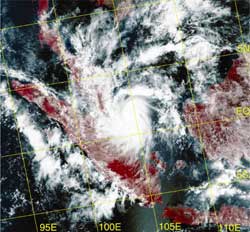90 % of all large fish including tuna, marlin, swordfish, sharks, cod and halibut are gone – leading scientists say need to attempt restoration on a global scale is urgent
The cover story of the May 15th issue of the international journal Nature reveals that we have only 10% of all large fish– both open ocean species including tuna, swordfish, marlin and the large groundfish such as cod, halibut, skates and flounder– left in the sea. Most strikingly, the study shows that industrial
New list spotlights most endangered turtles and action plan to save them
The Turtle Conservation Fund (TCF) today released its first-ever list of the World’s Top 25 Most Endangered Turtles to highlight the survival crisis facing the world’s tortoises and freshwater turtles and to unveil a Global Action Plan to prevent further extinctions. Fully 200 of the 300 living species of tortoises and freshwater turtles are threatened and require conservation action.
The TCF
We humans are poorly adapted for underwater vision. However, the Moken peoples of south-east Asia manage to collect shells, clams and sea cucumbers using no visual aids when diving to a depth of 3 or 4 metres. Scientists from Lund University in Sweden have now measured the visual acuity of these children and have found that their ability to see well underwater is not a myth: their acuity in this environment is indeed superior to that of European children. The scientists have also found an explanation
Your local weather forecaster uses Doppler radar systems, covering U.S. regions, to estimate rainfall and flooding, but NASA research satellites can see rainfall worldwide.
Data from NASA’s Tropical Rainfall Measuring Mission (TRMM)satellite, along with information from other satellites, allows researchers to see how much rain is falling over most of the world every three hours. This capability enables scientists to daily map areas of potential flooding.
These maps, available
Scientists have just returned from two months at sea aboard the oceanographic drill ship JOIDES Resolution where they studied the effects of a larger than expected methane release 55 million years ago that may have caused extreme global warming.
In March, the scientists traveled to a site near Walvis Ridge — an ancient submarine mountain chain off Africa—as part of the NSF-supported Ocean Drilling Program (ODP) Leg 208. The researchers searched for evidence of roughly 2,000 gigatons of meth

Hurricanes cannot form near the equator, or so meteorology textbooks maintain. But a storm named Typhoon Vamei upended scientists’ thinking when it swirled above the equator in the South China Sea near Singapore on December 27, 2001. It formed so close to the equator that its winds howled in both hemispheres.
New research funded by the National Science Foundation (NSF) and the U.S. Navy’s Office of Naval Research reveals the unusual mechanism for the birth of such a storm.